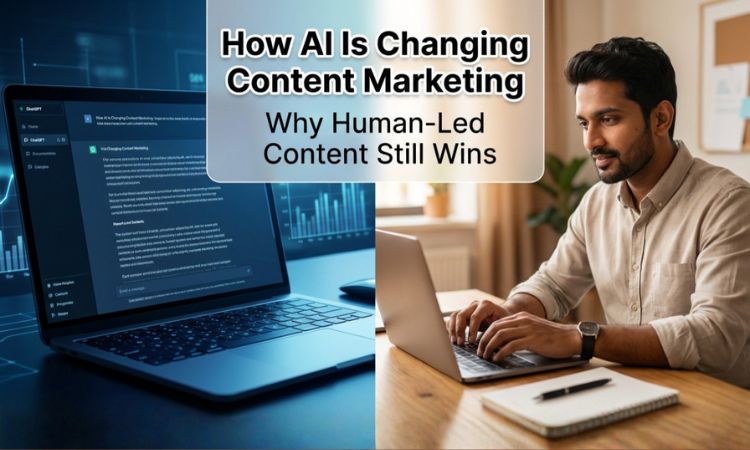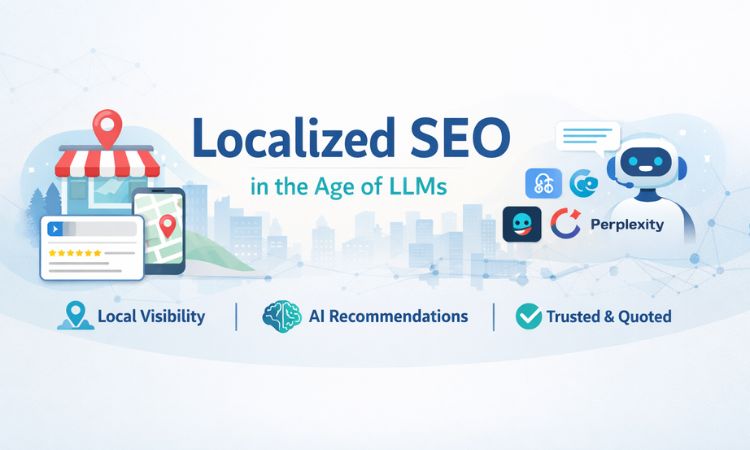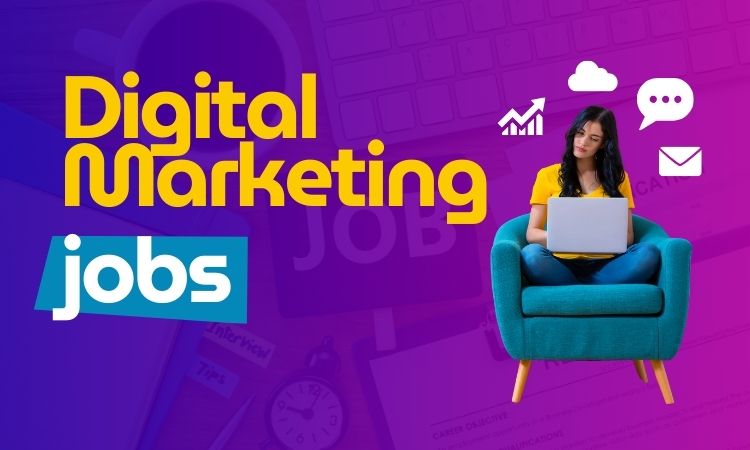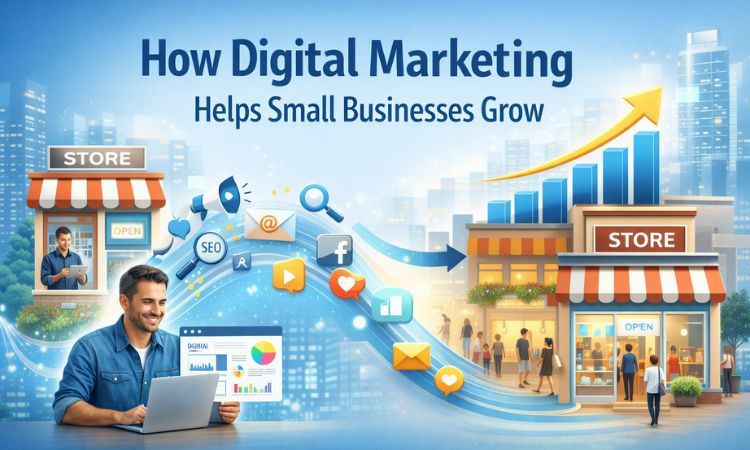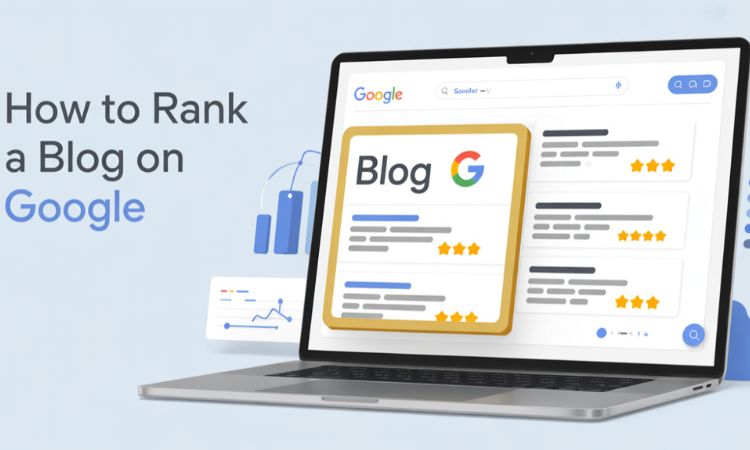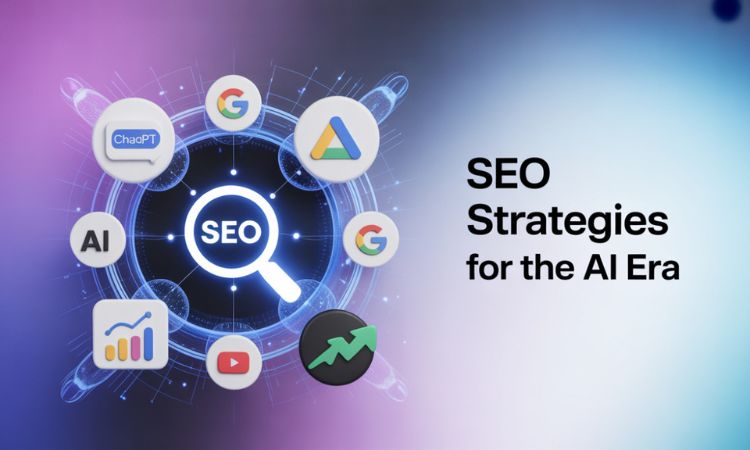The AI landscape has completely shifted everything. Users generally no longer click on the results—they are asking AI for the answers. This is not just a trend; this is an era of discovery. For different businesses the question is not “if you adapt or not?” This is about getting the right content and getting that ready for the AI’s go-to source. If the answer is not trusted by AI, you become invisible. AI is quick, fast, and easy to get results.lvinar dapibus leo.
Numbers don’t lie either. According to research done by SimilarWeb, zero-click searches have skyrocketed to around 56% and then 69%. After the AI overviews of Google rolled out—that means around 7 out of 10 searches can generally end without just anyone clicking on that link. Search Engine Land also found out AI has changed how people find answers, brands, or products, and this shift generally impacts SEO. This kind of shift impacts SEO.
Table of Contents
ToggleThe Bigger Picture of SEO and AI
The world thinks that SEO is ending or disappearing. The reality is, it’s not even dying. In fact, it’s evolving. With the rise of AI, SEO is not just adapting but getting smarter. More importantly, the user base is also increasing as millions of new users are turning to AI-driven platforms for answers and recommendations.
This shift shows that search isn’t fading away—it’s expanding. SEO is growing along with AI, learning its language, and mastering the new era of search visibility that works across both traditional search engines and AI platforms that people rely on today.
Top 8 SEO Strategies for the Age of AI
1. Website Structure: Speed Is Important
The fast world needs a faster response. In the AI era, website speed is important and actually nice. The Chat responses from Google’s AI mode, CoPilot, and ChatGPT influence around 36% of the searches.
If your site takes more than 3 seconds to load, AI platforms will simply jump to other websites. The core web vitals (Largest Contentful Paint, Cumulative Layout, and First Input Delay) have actually become more important.
Technical SEO fundamentals As in the mobile mode and mobile responsiveness, clean mode along with proper caching can remain essential for the AI visibility. Tools like Google PageSpeed Insights and Lighthouse can help in identifying and applying the fix.
2. Digital PR: Authority Still Matters
While the traditional backlinks can be built for remaining important, the focus has moved towards earning mention for authoritative sites for AI platforms that can be trusted. AI models like Grok, Google’s AI mode, or ChatGPT that can pull information from high-authority sources.
For chasing these generic backlinks, focus on getting the brand mentioned on trusted platforms, as in Forbes, Wikipedia, and TechCrunch, along with industry-specific applications.
Digital PR is not about quantity—this is about quality. A major mention for a high-authority site can have an impact on hundreds of low-quality links. In research done by Search Engine Land, “building your brand with PR is essential.” Beyond the backlinks, how this brand is talked about—and how consistent it is towards messaging across sources—will directly matter for GEO.
3. Fact-Checking: Truth Matters More Than Ever
For the age of AI, misinformation spreads fast and everywhere. AI models that can generate convincing information for accurate information, thus providing a verification critical for the content’s credibility.
- Different tools, like Perplexity and even deeper searches in Gemini, can help in verification of data by showing multiple sources that they are claiming.
- The deeper search in Gemini can cite sources and provides an in-depth search. Well, the problem is, it can take around half an hour to provide the proper search. Still, the content is verifiable with proper research reports.
- Microsoft CoPilot also has a deeper search mode that can also cite resources from where this data is taken and provide the proper research reports on that.
When creating content, do fact-check quotes, claims, and statistics. Pure AI-generated content that’s not with human verification has recently been penalized and punished for the recent algorithm updates. Do add the original research along with the expert analysis plus credible sources for the AI-formatted content.
Also Read: How to rank blogs faster
4. Q&A Sites: Where AI Finds Answers
AI platforms that generally and frequently pull out information from the Q&A sites like Quora, Reddit, and LinkedIn.
- These communities have strong community user engagement. This is complete human-written and shared content that AI models trust more.
- For instance, Google now features Quora and Reddit threads in its search results. When you can start engaging with these communities, you’re not only building awareness—you’re also creating content for all the AI platforms that can easily recite.
Why These Platforms Work
- The upvoting systems in Reddit thus create a major trust filter—content that gets pushed to the top is thus cited for its reliable sources.
- Quora’s “Top Writer” badge, along with the detailed answers, is generally referenced for AI-generated responses.
- The professional discussions on LinkedIn are generally used by enterprise-focused AI models like CoPilot.
How to use them in an effective manner
Solve and not just answer. When someone asks on Reddit (for instance), “What’s the best SEO tool for small businesses?” say, “We boosted the X-bakery traffic by 150% through the help of this SEO tool.” FAQ-style answers AI loves. Provide different citations and repurpose your insights into content.
Remember to keep your messaging somehow consistent on different platforms—AI chooses brands that have unified answers everywhere.
5. Appear Everywhere
The days of focusing just on Google are long gone. Users search for information across different platforms from Reddit to Quora to LinkedIn and more and sometimes inside AI tools like Perplexity or CoPilot.
Neil Patel called this phenomenon “Search Everywhere Optimization”—that being visible wherever your audience can start their search. Around 55% of the new-gen kids do treat Instagram and TikTok as their search engine. If you’re not on these platforms, you’re actually missing out.
- Take and repurpose your content to work on different platforms.
- Take that big or long-form content and turn that into short-form videos for Instagram carousels, Threads for X, or even answers for Quora and LinkedIn posts.
- Each platform thus requires different levels of formatting. Do remember to keep the message the same.
For instance, if a user asks “How do I rank in ChatGPT” on sites like Reddit, the latest and top answer comes from a digital marketer who had published a major case study for their blog. This answer was later provided in ChatGPT response for that same question—thus creating a major visibility loop.
The key is toward positioning this as a trusted expert that can provide value—no self-promotion here. When you can solve problems and provide solutions for people in these communities, you actually become a major part of the foundation for the AI responses.
6. Fundamental SEO: The Foundation
Whatever happens in the AI revolution, some of the traditional SEO fundamentals do remain important. AI models actually rely on search engine data, so clean website structure, credible backlinking, and on-page optimization are actually of new importance for SEO for AI.
Technical SEO things like clean code and proper schema markup, along with perfect mobile optimization, help AI to understand your content. As Search Engine Land explains, “The same levels of technical SEO skills that can help for searching of bots that can crawl along with interpreting the content that will continue for it to be valued for GEO”
Focus on the creation of comprehensive & well-structured content that can answer the question in a deep and thorough manner. AI models choose content that’s comprehensive and accurate, along with being reliable when selecting sources.
7. Keywords: GEO and AEO in Action
The keyword landscape has actually moved beyond traditional SEO. We should be moving towards more effective GEO (Generative Engine Optimization) along with AEO (Answer Engine Optimization).
- GEO means content optimization specifically for AI platforms and how these platforms generate answers. This includes Q&A formatting. Common questions and concise answers along with structured data that makes for easy AI for exact information.
- AEO focuses on answering the user questions and queries. Instead of targeting major or broad keywords, focus on creating specific questions that users ask. For instance, “How to optimize for Copilot” is much better than just “SEO strategies.”
- High-intent keywords that can drive conversions are highly valuable. During research, Ahrefs found that around 99.2% of usable keywords that triggered AI overviews were actually informal, along with action-oriented keywords like “best AI tools for small tools,” thus providing higher quality results.
8. Monitoring Your AI Presence
You just can’t manage what you’re not measuring. Do use certain tools like Distill.io or Visualping along with Ahrefs for tracking when exactly your content appears under AI-generated answers.
- Set up Google alerts for the brand name along with the key topics for monitoring of mentions for multiple platforms.
- Generally audit these workflows optimized for it for an AI era. What can work today may not work tomorrow.
- Be curious and experiment with new approaches and be willing to try new trends and approaches and be ready to change as this landscape continues to change.
The Future of SEO in the AI Era
The best and most successful marketers won’t be leaving SEO for jumping on “just” the AI era. They will combine both of these approaches and work out the best results. As Rank Math beautifully tells it, “The future of SEO is not about ranking on Google, but being visible wherever your audience goes and searches or asks questions.”
AI has not made SEO obsolete—it has actually elevated its need and importance. The brands that win will be those that will be with their audience wherever, whether they search and provide the right yet verifiable information and have strong technical foundations.
The real thought is in looking at AI, not as a threat, but as a major collaborator. With the use of AI tools you can easily enhance the workflow, but it does not work against authenticity along with the expertise for providing the speed.
As this era evolves further, the brands that are curious, adapt fast, and give a high level of consistency will actually dominate this era.
The future in SEO is not just chasing algorithms, but becoming a trusted source that anyone can easily quote.



